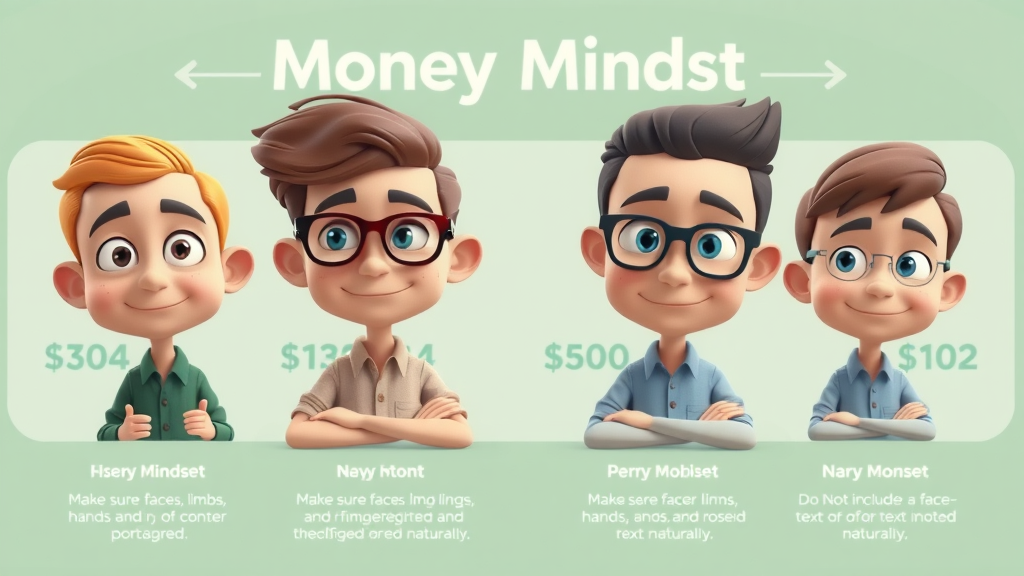What if the only thing standing between you and the wealth you desire is your money mindset? Imagine breaking free of hidden beliefs that quietly control your spending habits and financial decisions—what could you achieve? In this comprehensive guide, you'll discover powerful, practical steps to change your money mindset, paving the way to lasting wealth, mental health, and genuine abundance.

Are Your Money Mindset Beliefs Helping or Hurting Your Wealth?
Every day, your beliefs about money shape the choices you make—whether that’s how you spend money, save, or invest for the future. A healthy money mindset can mean the difference between building an emergency fund and remaining trapped in a vicious cycle of debt or scarcity. For a lot of people, old money stories—beliefs inherited from a young age, family, or even culture—run in the background, quietly sabotaging efforts toward financial success and independence.
The good news: these beliefs aren’t fixed. Whether you picked them up in high school, from stories like those by the York Times , or even from witnessing a lack of money at home, you can redefine your narrative. By learning how to change your money mindset , you unlock new ways to make money and improve your financial health. When you choose to shift your mindset, you set out on a path that millions (including leaders like Rachel Cruze ) have traveled—and found prosperity.
How to Recognize and Redefine Your Money Mindset
The first step in transforming your wealth is becoming aware of your current money mindset. Start by noticing your emotional reactions to financial events: Are you anxious about paying off debt, or excited by opportunities to invest? Do you believe you deserve abundance or feel guilty when you spend money on yourself?
Redefining your money mindset means challenging these beliefs head-on. Instead of accepting the scarcity mindset, cultivate an abundance mindset by asking better questions, seeking education, and reframing setbacks as opportunities for growth. Remember, the psychology of money deeply influences your behavior—conscious awareness and intentional shift are your keys to change.
- Proven methods to change your money mindset
- How your relationship with money shapes financial success
- Steps for achieving financial independence through mindset shifts
- The psychology of money and its impact on your wealth

Understanding the Money Mindset: Foundation for Building Wealth
Your money mindset is the lens through which you view personal finance—affecting every spending, saving, and investing decision. Developing a positive relationship with money is the cornerstone of financial health, leading to improved mental health, confidence, and life satisfaction. Countless studies and financial coaches emphasize that beliefs about money start forming at a young age but can be reconstructed at any point for greater wealth and control of your finances.
When you grasp the psychology of money , you begin to see patterns—like why some struggle to break a cycle of lack, while others thrive by adopting a growth or abundance mindset. The difference lies not in luck, but in the inner script playing in your mind. By focusing on positive change and financial education, you lay a new foundation for your financial future.
Defining Money Mindset and Its Role in Financial Success
Your money mindset is made up of core beliefs, self-talk, and emotional habits around money. For instance, someone with a growth money mindset sees challenges as opportunities, always looking for ways to change their money story for the better. Others may have a fixed money mindset , believing that their financial situation can't improve (“I will always struggle to make money” is a common refrain).
To set yourself up for financial success , it’s crucial to identify which camp you’re in. Do you invest with optimism or pull back out of fear? Do you view money as a tool to expand opportunities or a source of anxiety? Remember, changing your money mindset is possible—the journey starts when you decide to take control.
The Psychology of Money: Unpacking Your Attitudes and Beliefs
Psychologists and financial experts agree: Your mental attitudes around money form a kind of autopilot, influencing every financial decision you make. For example, a scarcity mindset might cause you to avoid investing, fearing loss more than valuing gain. Conversely, an abundance mindset helps you spot ways to increase wealth, invest in new skills, or build better money habits .
Ask yourself: What story did you internalize about money growing up? Are your habits today a result of these inherited beliefs? By exploring the psychology of money, you’ll see the connection between early experiences and adult patterns, which empowers you to break free and cultivate beliefs that serve your goals.
| Mindset Type | Characteristics | Financial Outcome |
|---|---|---|
| Growth Money Mindset | Sees wealth as expandable | High potential for financial growth |
| Fixed Money Mindset | Believes wealth is limited | Stagnant financial outcomes |
| Abundant Mindset | Focus on opportunity and prosperity | Increased satisfaction and wealth |
| Scarcity Mindset | Fears lack and financial loss | Chronic financial stress |

How to Change Your Money Mindset for Lasting Wealth
To change your money mindset for good, start by recognizing the limiting beliefs that have held you back. Are you constantly afraid of not having enough? Do you question your ability to build an emergency fund or believe that financial independence is out of reach? These beliefs don't need to control you. Shifting to an abundance mindset opens new doors for earning, saving, and investing, allowing you to rewrite the story you’ve been told about money.
Understand that your current financial situation is not permanent—even the most challenging patterns can be changed with the right tools. From adjusting spending habits to seeking expert guidance (like from Rachel Cruze), reframing how you value yourself and your potential will set you on a sustainable path toward lasting wealth.
As you work to shift your beliefs and habits, it can be incredibly motivating to see how others have navigated similar journeys. For example, Amanda Reed’s story offers a real-world perspective on overcoming limiting money beliefs and building a foundation for financial growth.
Recognizing Limiting Money Beliefs That Hold You Back
Limiting beliefs often sound like, “Money doesn’t grow on trees,” or “I’ll never get out of debt.” These thoughts create mental barriers, leading to poor money habits and financial decisions that reinforce the status quo. Many people unknowingly inherit these beliefs, then spend years in a similar situation—overspending, under-saving, or fearing they’ll never make money work for them.
By identifying the internal scripts that no longer serve you, you’re able to challenge and replace them. Write down your most persistent thoughts about money, ask yourself if they’re truly factual, and compare them to the reality of those who’ve achieved real financial independence.
Transforming Your Relationship with Money: Actionable Strategies
Successful transformation hinges on action. Start by consistently challenging negative self-talk and adopting new financial habits: track your spending, create budgets, and celebrate small wins. Embrace abundance thinking by focusing on gratitude for your progress, and visualize the financial future you desire. Practical tools, like positive affirmations and goal setting, daily journaling, or following positive role models, foster an empowered relationship with money.
Remember, changing your relationship with money isn’t just about getting rich—it’s about reducing mental health stress, strengthening your control of your finances, and making aligned financial decisions each day.
- Identify limiting beliefs
- Challenge negative self-talk around money
- Embrace abundance thinking
- Set empowering financial goals
Change Your Money Mindset: Step-by-Step Transformation Plan

- Assess your current money mindset – Track your beliefs, emotional responses, and spending habits to see where you are starting from.
- Journal your money story – Write honestly about your earliest memories and lessons concerning money. What did family or mentors like Rachel Cruze teach you about abundance or scarcity?
- Replace limiting beliefs with empowering thoughts – Consciously swap negative self-talk for mantras like, “I can learn personal finance skills,” or, “Wealth is accessible to me.”
- Practice positive money affirmations daily – Repeat phrases that align with your financial future, such as, “I make wise financial decisions,” or, “My wealth is growing every day.”
- Create new money habits for lasting change – Automate savings, review your spending habits, and celebrate moments when you adhere to your new mindset.
Looking for a deeper dive? Search online for reputable content, such as TED Talks or financial psychologists, who break down the science behind mindset and true financial independence.
The Relationship with Money: How Mindset Drives Your Financial Choices

Your relationship with money is reflected in every financial decision you make, from spending habits to the way you save or invest. People with an abundance mindset often seek opportunities and achieve greater satisfaction and wealth, while those with a scarcity mindset may experience chronic stress and struggle to break out of the vicious cycle of ‘never enough’.
It’s not about how much you make money, but how you treat and feel about it. Are your daily choices guided by fear or confidence? When you change your money mindset, you transform the very core of your financial life—opening up possibilities you may have never considered before.
Real Stories: Transforming Your Relationship with Money
Millions have rewritten their money stories by embracing mindset shifts. Take someone who struggled for years with paying off debt and fearing a lack of money, but after actively working to change their beliefs, found themselves saving more, investing confidently, and enjoying stronger mental health. Even the most challenging financial situations can improve with persistent, positive changes in beliefs and habits.
Whether you find yourself in a similar situation or are just starting your journey, know that many financial success stories began with a single choice: to challenge old beliefs and step bravely into new opportunities.
"You do not rise to the level of your goals. You fall to the level of your systems." — James Clear
Explore top-rated interviews and webinars from financial coaches and psychologists who illustrate how to break free from old patterns and reinforcing habits that fuel a healthy money mindset.
Financial Independence and the Money Mindset Connection
Why Changing Your Money Mindset is Essential for Financial Freedom

Financial independence starts in the mind—not in your bank account. People who have achieved wealth didn’t just make money ; they actively worked to change their money mindset . They recognized the importance of moving from a scarcity mindset to abundance thinking and committed to financial education and bold financial decisions. When you shift your beliefs about money, you unlock the discipline and vision needed to reach your biggest goals.
Building an emergency fund, investing for the future, or even paying off debt becomes much easier when you see these financial habits as systems that support your growth, not obstacles to overcome. Remember, your mindset determines your financial future, more than any single dollar ever will.
Search for expert talks and success stories about the psychology of money and see how changes in mindset have directly contributed to financial independence for people from all walks of life.
The Psychology of Money Explained: How Beliefs Shape Outcomes
Exploring the Four Core Money Mindsets

The four main money mindsets —abundance, scarcity, growth, and fixed—offer a powerful framework for understanding your own financial behaviors and outcomes. Each is rooted in specific beliefs about wealth, risk, and opportunity.
Abundance mindset sees potential and plenty, leading to wise saving and investing. Scarcity mindset is driven by fear of lack, often resulting in missed opportunities and chronic stress. The growth mindset focuses on learning and increasing wealth, while the fixed mindset feels powerless to change financial status, avoiding risk or new approaches. Being aware of which mindset dominates your thinking is crucial for initiating and sustaining positive change.
| Mindset | Core Belief | Typical Behavior |
|---|---|---|
| Abundance | There is enough for all | Saves and invests wisely |
| Scarcity | There is never enough | Avoids spending/investing |
| Growth | Money can be increased | Seeks learning and risk |
| Fixed | Money is predetermined | Avoids change/risks |
List: Actions to Positively Change Your Money Mindset Today

- Educate yourself about personal finance
- Surround yourself with abundance thinkers
- Practice gratitude for your current financial state
- Visualize your financial goals daily
- Invest in mindset and wealth-building resources
People Also Ask: Money Mindset, Beliefs, and Improvement
What are the 4 money mindsets?
The four primary money mindsets are abundance , scarcity , growth , and fixed . Each determines your approach to money, risk-taking, and long-term wealth creation.

What is the money mindset?
Money mindset refers to your attitudes, beliefs, and habitual thoughts about money. It shapes your financial decisions, risk tolerance, and ability to build lasting wealth.
How do I improve my money mindset?
To improve your money mindset, identify limiting beliefs, practice gratitude, seek financial education, use positive affirmations, and take practical actions toward your goals.
What are the 4 money beliefs?
The four key money beliefs relate to abundance (there’s enough wealth), scarcity (never enough), growth (money can be created), and fixed (money status is unchangeable). These beliefs influence everyday financial habits.
Frequently Asked Questions About the Money Mindset
- How can a positive money mindset lead to greater wealth? When you focus on abundance and opportunities, you make better financial decisions and take strategic actions that multiply your wealth over time.
- Is it possible to completely change your money mindset as an adult? Yes. With intentional practice, reflection, education, and support, adults can shift deep-seated beliefs to create a more empowered relationship with money.
- What daily habits reinforce a healthy money mindset? Daily habits like positive affirmations, mindful spending, gratitude journaling, financial goal visualization, and continuous learning support a thriving money mindset.
- How does the psychology of money impact financial independence? Your mindset shapes risk tolerance, savings, investments, and overall financial decisions—ultimately determining your path to financial independence.
Key Points to Remember When Shifting Your Money Mindset

- Your mindset about money determines your financial quality of life.
- Mindset shifts require conscious practice and positive reinforcement.
- Investing in your financial education and support systems accelerates change.
- A changed money mindset is the foundation of true wealth.
Take Action Now to Transform Your Money Mindset
Want to master your money mindset and attract true abundance? Visit wealthywomaneveryday.com to start your transformation today.
If you’re inspired to take your money mindset journey even further, consider exploring the stories of other women who have redefined their financial futures. Keyuna Milam’s experience highlights the power of strategic mindset shifts and the impact of community support on long-term wealth. By learning from diverse perspectives and advanced strategies, you can accelerate your own transformation and unlock new levels of abundance. Let these real-life journeys motivate you to keep growing, investing in yourself, and building the financial confidence you deserve.
 Add Row
Add Row  Add
Add 




Write A Comment